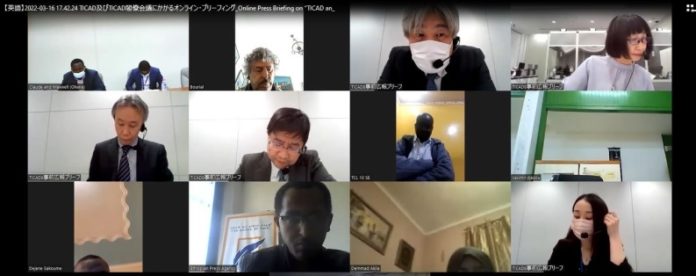By Amin Kef Sesay
The Tokyo International Conference on African Development (TICAD) held an online Press Briefing on the 16th March 2022 with over 60 journalists from 30 countries across Africa to inform them about the forthcoming Ministerial online meeting slated for the 26th-27th March 2022 and the TICAD 8 Conference to be held in August on the 27th and 28th August 2022.
It must be noted that TICAD is a summit-level international conference on Africa’s development initiated by Japan in 1993 as a multilateral international conference to address development issues in Africa co-organized by the Government of Japan, UN, UNDP, World Bank, and AUC.
The Deputy Director General, Department of Africa Affairs in the Japanese Ministry of Foreign Affairs intimated that Japan has led the forum with its history of over a quarter-century to promote African development while respecting Africa’s ownership.
He continued that the main objectives of the Ministerial meeting is to discuss priority issues on African development at Ministerial level to a view to looking ahead to TICAD 8.
The Deputy Director General further maintained that the Ministerial meeting is also to set out a pathway for African development with an emphasis on “people” and “quality growth”, as well as call for international cooperation.
He also added that it is also to strengthen the bilateral relationships with African countries and share the priorities of Japan’s diplomacy with them such as the realization of a “Free and Open Indo-Pacific” and addressing development finance issues.
“Participants will discuss Africa’s development based on three pillars which are economy, society and peace/stability,” he informed adding how the participants for the Ministerial Meeting will comprise the Government of Japan, 50 African countries, TICAD co-organizers and Union Commission.
The Deputy Director General revealed that they will be looking ahead of the post COVID-19 era adding that the format of the forthcoming TICAD 8 will be determined in due course taking into account such factors as the situation surrounding COVID-19.
Vice President of the Japan International Cooperation Agency (JICA) pointed out that the organization was established in 2003, with an Head Quarter in Tokyo, 96 Overseas Offices and 15 Domestic Offices.
He continued that JICA has executed different projects in all African countries like the Initiative for Food and Nutrition Security in Africa (IFNA), a framework of collaboration to accelerate the implementation of food and nutrition security policies in all African countries with it partners.
“The organization’s effort to assure learning opportunity for children under a project called “School for all” is to improve access to quality education through school management with ownership and participation of communities,” he highlighted mentioning that their Project known as NINJA (Next Innovation with Japan) is to create ecosystems to foster African entrepreneurs who can resolve social issues among many other good works that JICA had been executing in African countries.
He mentioned that at TICAD 7, which was held in Yokohama in August 2919, private companies were recognized as official partners for the first time and the Public-Private Business Dialogue between Japan and Africa was held in the plenary session. The Government of Japan supports Japanese companies’ projects in Africa by making the most use of ODA, he added.
“Japan announced ‘TICAD-7: Japan’s Contributions for Africa’ which included measures to provide support using ODA,” he stated.
It was further highlighted that Africa is important to Japan because it has the largest regional group in the United Nations maintaining that out of 193 member States 54 are in Africa, that it is a continent with enormous potential , has an annual average economic growth rate of approximately 5% in the Sub-Saharan region from 2001-2021, predicted to become a market for more than 2.5 billion people, a quarter of the world’s population, has wealth of minerals and energy resources being extracted as new technology develops.
The online meeting was climaxed by a question and answer session with the moderators ensuring that appropriate answers were provided to the probing questions certain participants forwarded.




